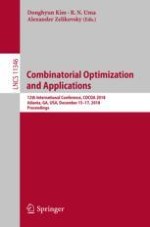2018 | OriginalPaper | Chapter
Inefficiency of Equilibria in Doodle Polls
Authors : Barbara M. Anthony, Christine Chung
Published in: Combinatorial Optimization and Applications
Publisher: Springer International Publishing
Activate our intelligent search to find suitable subject content or patents.
Select sections of text to find matching patents with Artificial Intelligence. powered by
Select sections of text to find additional relevant content using AI-assisted search. powered by
